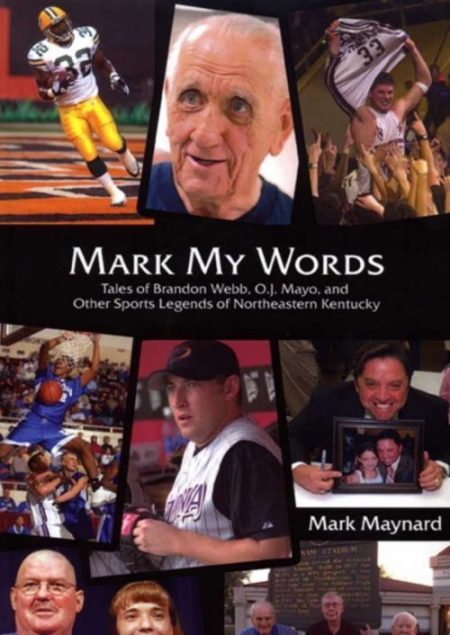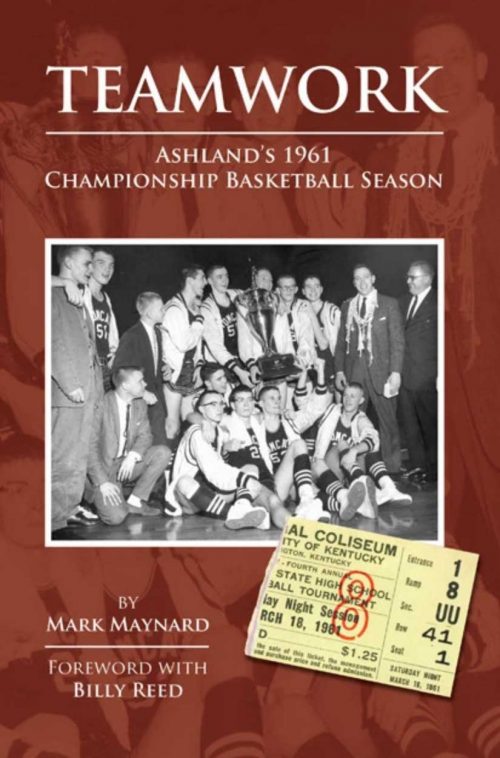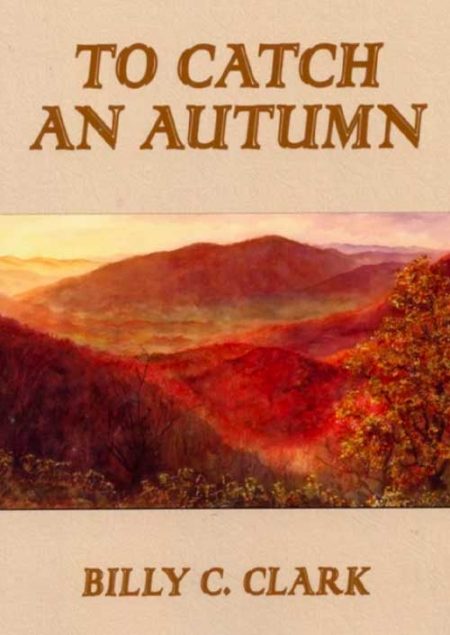-
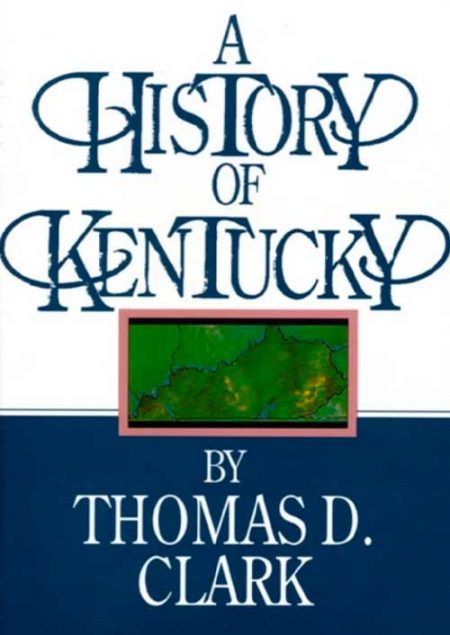 Kentucky’s history is an important part of American development because the state lay directly in the path of the great westward movement. It was in Kentucky that the early adjustments to the rigors of frontier life were made. Along the Kentucky River, Daniel Boone and a small band of settlers repulsed British and Indian thrusts to guard the back door of the struggling young nation during the Revolution. Under George Rogers Clark, the Kentuckians even carried the fight to British and Indian concentrations along the Ohio. HARDBACK By Thomas D. Clark
Kentucky’s history is an important part of American development because the state lay directly in the path of the great westward movement. It was in Kentucky that the early adjustments to the rigors of frontier life were made. Along the Kentucky River, Daniel Boone and a small band of settlers repulsed British and Indian thrusts to guard the back door of the struggling young nation during the Revolution. Under George Rogers Clark, the Kentuckians even carried the fight to British and Indian concentrations along the Ohio. HARDBACK By Thomas D. Clark -
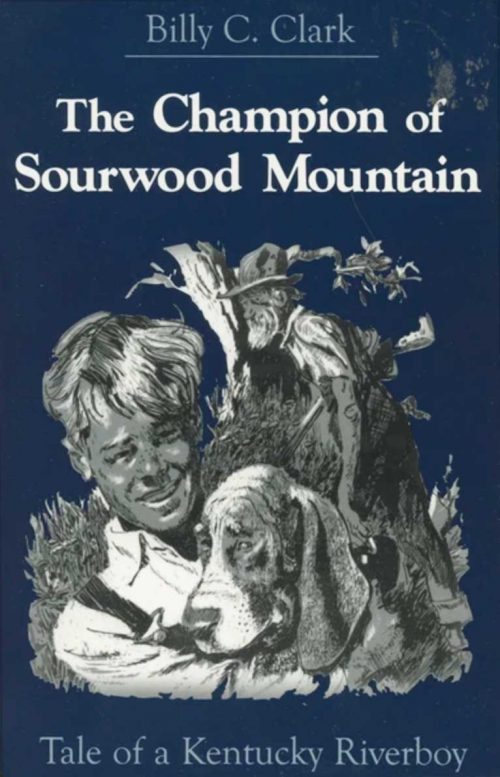 The people, the lore, even the sounds of eastern Kentucky come vividly to life in this affectionate story of a boy and his search dog. In the shadow of Sourwood Mountain, fourteen-year-old Aram Tate is absorbed in the sometimes painful process of growing up. His all-consuming passion is to own a hound dog of his very own, and his efforts to achieve this dream involve him in a series of amusing adventures which broaden his boy's-eye view of the world. Through his friendship with ne'er-do-well Eb ringtom, Aram Learns the ways of men as they never were described in books. Among the other colorful characters who contribute to the boy's education are Lighting and Napoleon, two imcomparably wily gamecocks; Thusla, Eb's great hound whose exploits can only be described as apocryphal; and Rile Feder and his dog, the bluetick Tweedle, who fears neither coon nor fox. SOFTBACK By Billy C. Clark
The people, the lore, even the sounds of eastern Kentucky come vividly to life in this affectionate story of a boy and his search dog. In the shadow of Sourwood Mountain, fourteen-year-old Aram Tate is absorbed in the sometimes painful process of growing up. His all-consuming passion is to own a hound dog of his very own, and his efforts to achieve this dream involve him in a series of amusing adventures which broaden his boy's-eye view of the world. Through his friendship with ne'er-do-well Eb ringtom, Aram Learns the ways of men as they never were described in books. Among the other colorful characters who contribute to the boy's education are Lighting and Napoleon, two imcomparably wily gamecocks; Thusla, Eb's great hound whose exploits can only be described as apocryphal; and Rile Feder and his dog, the bluetick Tweedle, who fears neither coon nor fox. SOFTBACK By Billy C. Clark -
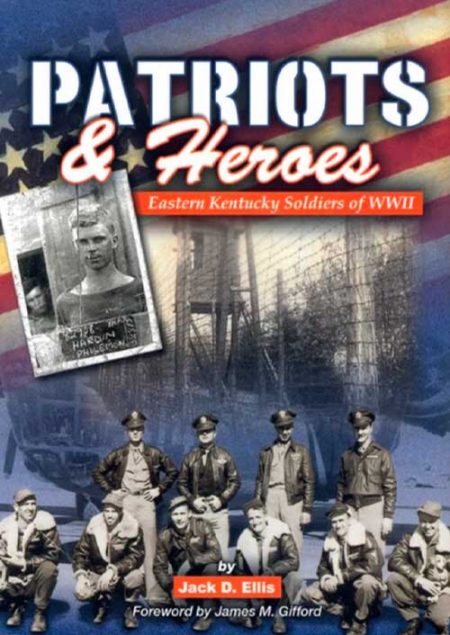 Patriots & Heroes: Eastern Kentucky Soldiers of WW II profiles the physical pain, and also the psychological and emotional stress suffered by a dozen of America's Citizen Soldiers in WW II. Their stories are representative of the courage, suffering, sacrifice and separation faced by the American GIs of that war. Included among these twelve are stories of POWs, KIAs, MIAs and many that returned home safely to become valuable, productive members of their community. The author uses interviews, letters, documents, and personal experiences to poignantly present their stories. HARDBACK By Jack D. Ellis
Patriots & Heroes: Eastern Kentucky Soldiers of WW II profiles the physical pain, and also the psychological and emotional stress suffered by a dozen of America's Citizen Soldiers in WW II. Their stories are representative of the courage, suffering, sacrifice and separation faced by the American GIs of that war. Included among these twelve are stories of POWs, KIAs, MIAs and many that returned home safely to become valuable, productive members of their community. The author uses interviews, letters, documents, and personal experiences to poignantly present their stories. HARDBACK By Jack D. Ellis -
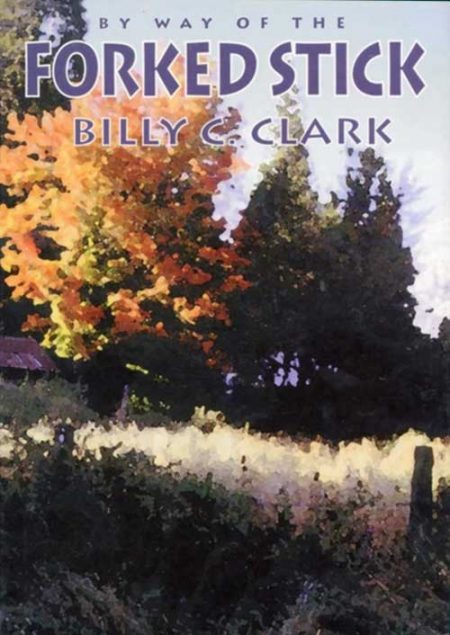 In the little Appalachian town of Sourwood, life at the end of the Great Depression may have been tough, but it was rich beyond compare. Building on a distinguished body of work celebrating and preserving mountain culture, renowned writer Billy C. Clark once again revisits his boyhood during a bygone era. By Way of the Forked Stick offers four fictional stories drawn from the author's childhood experiences of the 1930s—tales that vividly convey the down-home spirit of a lost way of life. By Billy C. Clark
In the little Appalachian town of Sourwood, life at the end of the Great Depression may have been tough, but it was rich beyond compare. Building on a distinguished body of work celebrating and preserving mountain culture, renowned writer Billy C. Clark once again revisits his boyhood during a bygone era. By Way of the Forked Stick offers four fictional stories drawn from the author's childhood experiences of the 1930s—tales that vividly convey the down-home spirit of a lost way of life. By Billy C. Clark -
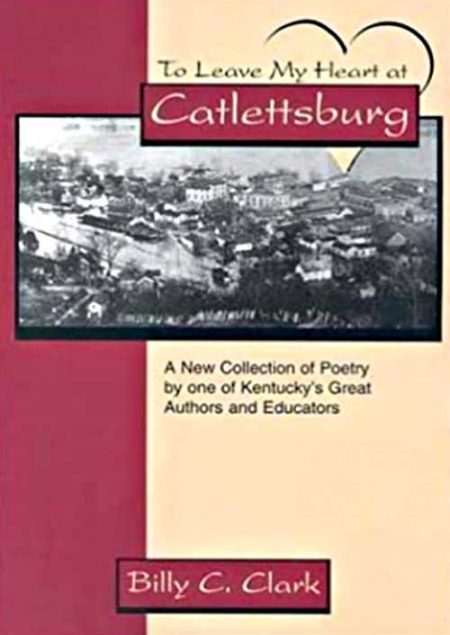 This sense of appreciation for earth and its creatures runs through all of the poems in To Leave My Heart at Catlettsburg and results in a poignant literacy tribute, a gift to a town and its people. Beyond that, this book reminds all readers to observe the world more carefully and to listen more sensitively, to be more alive to the beauty and sturggles around us, to be more grateful for passing through. By Billy C. Clark
This sense of appreciation for earth and its creatures runs through all of the poems in To Leave My Heart at Catlettsburg and results in a poignant literacy tribute, a gift to a town and its people. Beyond that, this book reminds all readers to observe the world more carefully and to listen more sensitively, to be more alive to the beauty and sturggles around us, to be more grateful for passing through. By Billy C. Clark -
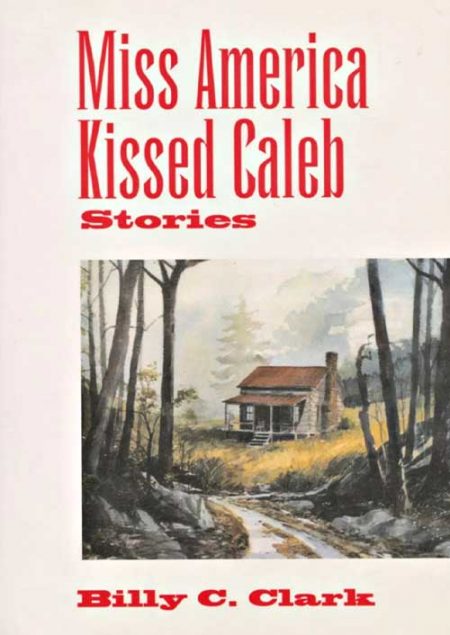 The mountain is a lonely place. Welcome to Sourwood, a small Kentucky town inhabited by men and women unique and yet eerily familiar. Among its joyful and tragic citizens we meet the crafty, spirited Caleb and his curious younger brother; Pearl, a suspected witch, and her sheltered daughter, Thanie; superstitious Eli; and the doomed orphan Girty. In Sourwood, the mountain is both a keeper of secrets and an imposing, isolating presence, shaping the lives of all who live in its shadow. Strong in both the voice and sensibilities of Appalachia, the stories in Miss America Kissed Caleb are at turns heartbreaking and hilarious. In the title story, young Caleb turns over his hard-earned dime to the war effort when he receives a coaxing kiss from Miss America, who sweeps into Sourwood by train, "pretty as a night moth." Caleb and his brother share in the thrills and uncertainties of growing up, making an accidental visit to a brothel in "Fourth of July" and taming a "high society" pooch in "The Jimson Dog." These stories invoke a place and a time that have long passed―a way of living nearly extinct―yet the beauty of the language and the truth revealed in the characters' everyday lives continue to resonate with modern readers. By Billy C. Clark
The mountain is a lonely place. Welcome to Sourwood, a small Kentucky town inhabited by men and women unique and yet eerily familiar. Among its joyful and tragic citizens we meet the crafty, spirited Caleb and his curious younger brother; Pearl, a suspected witch, and her sheltered daughter, Thanie; superstitious Eli; and the doomed orphan Girty. In Sourwood, the mountain is both a keeper of secrets and an imposing, isolating presence, shaping the lives of all who live in its shadow. Strong in both the voice and sensibilities of Appalachia, the stories in Miss America Kissed Caleb are at turns heartbreaking and hilarious. In the title story, young Caleb turns over his hard-earned dime to the war effort when he receives a coaxing kiss from Miss America, who sweeps into Sourwood by train, "pretty as a night moth." Caleb and his brother share in the thrills and uncertainties of growing up, making an accidental visit to a brothel in "Fourth of July" and taming a "high society" pooch in "The Jimson Dog." These stories invoke a place and a time that have long passed―a way of living nearly extinct―yet the beauty of the language and the truth revealed in the characters' everyday lives continue to resonate with modern readers. By Billy C. Clark -
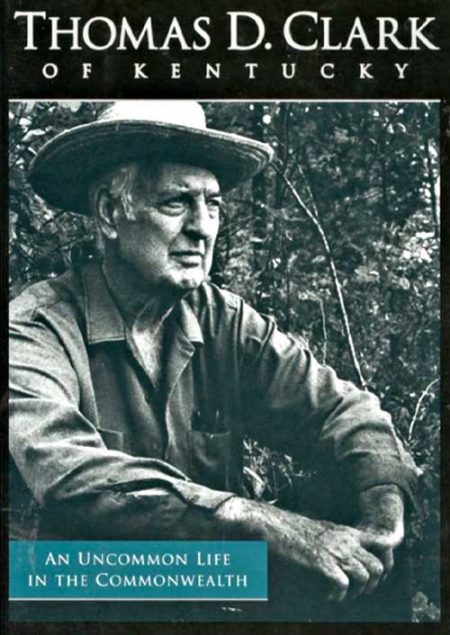 In 1990, the Kentucky General Assembly honored Thomas D. Clark by declaring him Kentucky’s Historian Laureate for life, at which time Governor Brereton Jones described him as “Kentucky’s greatest treasure.” Thomas D. Clark of Kentucky; An Uncommon Life in the Commonwealth is a celebration and exploration of the unparalleled life and career of a man who has both recorded the history and shaped the future of his adopted home state. Born on July 14th 1903, in Louisville, Mississippi, to a cotton farmer and a public school teacher, Clark was the oldest of seven children. Before enrolling in high school at age eighteen, he worked on a farm, in a sawmill, and as a cabin boy and deck hand on a dredge boat. After attending the University of Mississippi and earning graduate degrees at the University of Kentucky and Duke University, Clark joined the faculty of the University of Kentucky in 1931. There he chaired the history department from 1942 until 1965, influencing the lives of thousands of students.
In 1990, the Kentucky General Assembly honored Thomas D. Clark by declaring him Kentucky’s Historian Laureate for life, at which time Governor Brereton Jones described him as “Kentucky’s greatest treasure.” Thomas D. Clark of Kentucky; An Uncommon Life in the Commonwealth is a celebration and exploration of the unparalleled life and career of a man who has both recorded the history and shaped the future of his adopted home state. Born on July 14th 1903, in Louisville, Mississippi, to a cotton farmer and a public school teacher, Clark was the oldest of seven children. Before enrolling in high school at age eighteen, he worked on a farm, in a sawmill, and as a cabin boy and deck hand on a dredge boat. After attending the University of Mississippi and earning graduate degrees at the University of Kentucky and Duke University, Clark joined the faculty of the University of Kentucky in 1931. There he chaired the history department from 1942 until 1965, influencing the lives of thousands of students. -
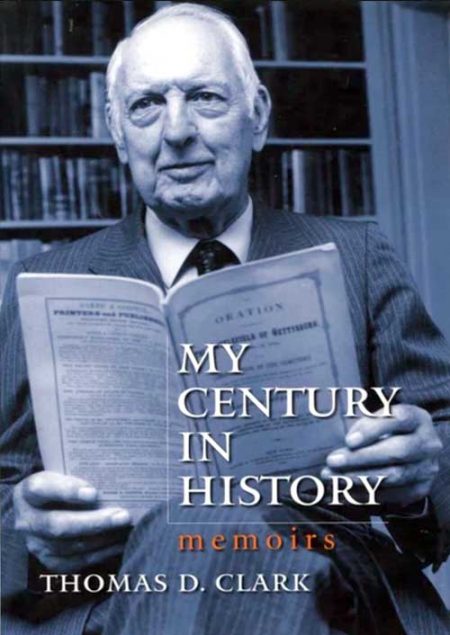 When Thomas D. Clark was hired to teach history at the University of Kentucky in 1931, he began a career that would span nearly three-quarters of a century and would profoundly change not only the history department and the university but the entire Commonwealth. His still-definitive History of Kentucky(1937) was one of more than thirty books he would write or edit that dealt with Kentucky, the South, and the American frontier. By Thomas D. Clark
When Thomas D. Clark was hired to teach history at the University of Kentucky in 1931, he began a career that would span nearly three-quarters of a century and would profoundly change not only the history department and the university but the entire Commonwealth. His still-definitive History of Kentucky(1937) was one of more than thirty books he would write or edit that dealt with Kentucky, the South, and the American frontier. By Thomas D. Clark -
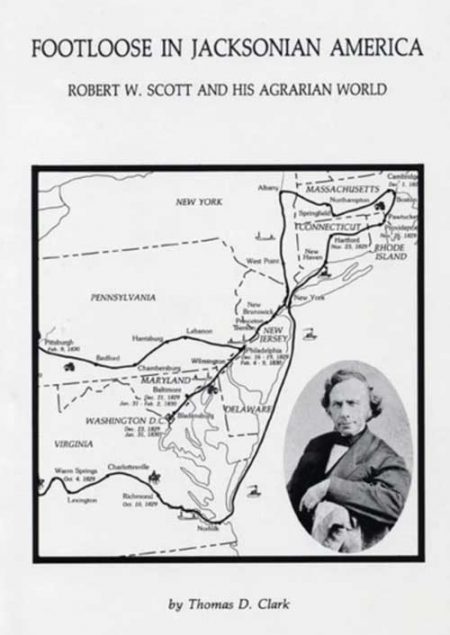 In the fall of 1829, young Robert Wilmot Scott rode away from Frankfort Kentucky on a trip that would take him through nine states. His journal entries about those travels present a vivid picture of Jacksonian America and of the prominent people of that era. Excellent pen portraits of James and Dolly Madison, James Monroe, John Marshall, James Buchanan, Sam Houston, Edward Everett, John C. Calhoun, John Randolph, John Quincy Adams, and others show Scott to be a famous Webster-Hayne debate; he gives a rich account of that discussion and its personalities. By Thomas D. Clark
In the fall of 1829, young Robert Wilmot Scott rode away from Frankfort Kentucky on a trip that would take him through nine states. His journal entries about those travels present a vivid picture of Jacksonian America and of the prominent people of that era. Excellent pen portraits of James and Dolly Madison, James Monroe, John Marshall, James Buchanan, Sam Houston, Edward Everett, John C. Calhoun, John Randolph, John Quincy Adams, and others show Scott to be a famous Webster-Hayne debate; he gives a rich account of that discussion and its personalities. By Thomas D. Clark


